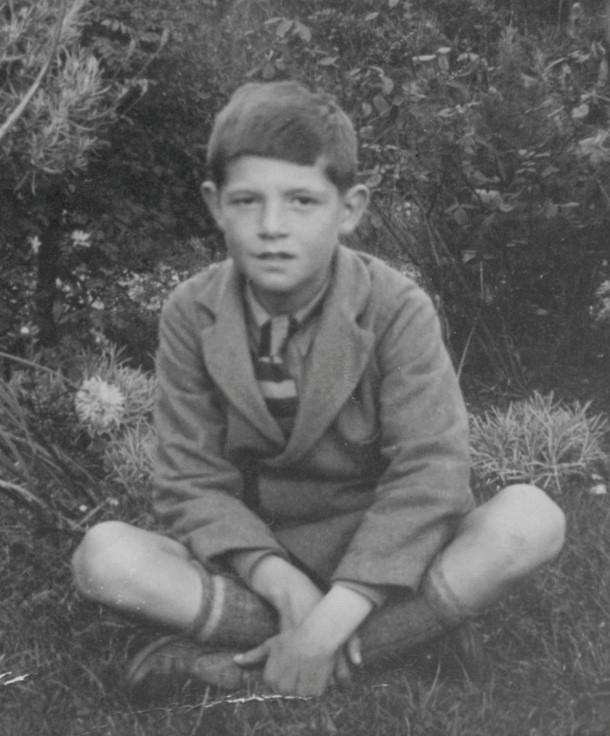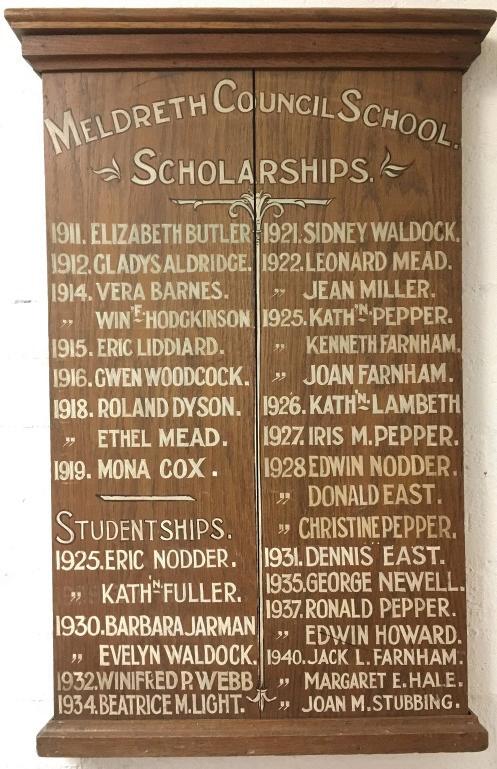
5 minute read
Local History Group
Memories of Meldreth
Memories of Meldreth and the War by George Newell is one of the latest pages to be added to Meldreth Local History Group’s website. After George’ died in 2013, his son Colin found George’s handwritten memories and kindly allowed the History Group to include them on its website. The following extract concerns George’s memories of Meldreth, where he lived from 1932 until 1947. To read the whole article, including information about George’s wartime work at the Engineering Laboratories in Cambridge, please see our website: www.meldrethhistory.org.uk/new-contributions/memories-of-meldrethand-the-war.
Advertisement
In late 1932, when I was 8 years old, my family and I moved to Meldreth. Dad had just retired from the Police Force and had, a year earlier, purchased Cornwall House and its orchard in Stone Lane, North End from his brother-in-law, George Nodder. I started at Meldreth Village School in December 1932. I went there until I was 11. The headmistress at this time was Miss Grace Butler. There were two other mistresses, sometimes three. Although my mother tried to ‘push’ my education, at that time I was not too willing a pupil. George Newell Supplied by Colin Newell I can remember the Jubilee sports (George V & Queen Mary) mainly for the astonishing performance my father showed in several of the events. I remember he won the 100 yards sprint followed by the slow bicycle race. He was a very fit man. I used to either walk or cycle to school, about a mile each way. We sometimes played marbles on the way in the summer or had whipping tops. In the winter time many of us had hoops of steel approximately ¼ inch round section and 2 – 2½ feet diameter, which we trundled
along the road with a wooden rod about 15 inches long, trying to keep it moving and also control its direction. Together with cycling, this kept us fit. I cannot remember any organised games at Meldreth School, just some very basic P.E. after morning prayers. I do remember several children contracting tuberculosis (TB), two of whom died. This was a very serious disease at the time and patients were sent away to sanatoriums to live with as much access to sunshine and fresh air as possible. The spread of TB was mostly through milk, most, if not all of which, was not pasteurised. Milk was sold from open churns, the amount being measured out in half-pint or pint scoops into all kinds of containers. Any farmer could sell his milk to anyone who would buy it. I do not know when the testing of dairy herds for TB began but there was, as far as I know, none in the Meldreth area in the early 1930s. Fortunately I did not like cold milk. At the school leaving exam in 1935 I won a minor scholarship [from the Triggs Charity, which still exists] and went to the County High School for Boys in Hills Road, Cambridge. There was no piped water or sewerage in villages in those days. In Meldreth there were a number of natural springs from which we obtained drinking water. Our family had to fetch the drinking water in galvanised buckets from a spring about a quarter of a mile away. We paid one shilling a year for this water. Rainwater for washing and laundry was collected in tanks The School Scholarships or pumped by hand from boreholes. Board where George Laundry was done by boiling the clothes in a Newell’s name appears “copper”. This was a large (2½ ft diameter) hemisphere of copper recessed into a square Photograph by Andrew Jones brick-built fireplace with chimney, which heated the wash-water in the ‘copper’ from underneath, using sticks, wood and coal. The laundry was agitated with a copper dolly on a long wooden handle. The laundry, after boiling, was then put through the “mangle” – a wringer with large wooden rollers to squeeze out the water. The usual Monday “wash-day” took all morning.

My formative life revolved around fruit farming – mostly apples and plums. It was a hard life. There had been a national recession for several years and money was tight. My older stepbrother Bill also lived and worked at home. There was also Ralph, my younger brother by two years. During the fruit-picking season the whole family had to ‘muck in’. There were a lot of plum trees of the variety “Pond’s Seedling”. The trees were very tall and usually bore very heavy crops to such an extent that branches sometimes fractured with the weight of the plums. On some occasions I was made to climb up very tall ladders held vertically by two men because the branches would not bear the weight of the fruit plus a man on a ladder. I was thus indoctrinated to heights at an early age. Fruit was sent to Covent Garden market by goods train, so it had to be packed into round wicker baskets, covered with newspaper, which in turn was covered with straw, which was tied down. These were then loaded on to a pony cart and one of us, often myself, drove it to Shepreth station for the overnight journey to London. There it was auctioned. After transport charges and auctioneers commission, in times of glut little was left for us, sometimes just 6d for 20lbs of fruit. I used to make some pocket money by picking up fallen apples for the local cider company. I remember I sometimes made a shilling a hundredweight. Two or three tons sometimes accumulated before they were collected and by this time many were rotten, but they were pressed for cider just the same. Times were hard then and money was scarce, but we were never hungry. We grew all our own vegetables and of course had plenty of fruit. My mother made jam and preserved a lot of soft fruit and plums. She also made pickles of all descriptions. We kept a lot of chickens in the orchards, sold the eggs and also some table chickens and geese and ducks for the Christmas trade. From about the age of 12 I kept a sow and reared the piglets, one of which was fattened and kept for eating ourselves. There were no freezers in those days, so some of the pork was salted and made into bacon and ham. When the war came the rifle was also a very important tool in acquiring food.
Meldreth Local History Group www.meldrethhistory.org.uk info@meldrethhistory.org.uk






